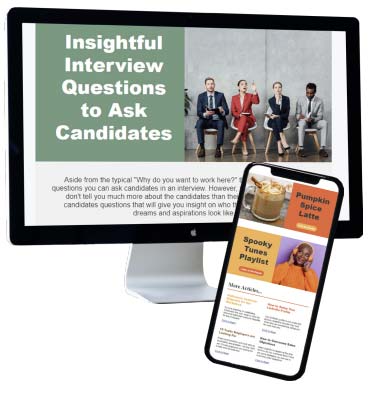Before You Go!
Sign up for our newsletter - which features professional templates, job market updates, articles, playlists, recipes, and more, sent directly to your inbox!


Although social media seems inherently casual, it's easy to forget that your online profiles are public information that can be accessed by anyone, including potential employers. According to a survey by CareerBuilder.com, 43 percent of employers check social media to review potential candidates for jobs, and more than half these employers reported that they discovered information that stopped them from hiring someone. When it comes to social media, you can't leave it up to luck and hope that employers will simply miss that unfortunate photo of you at your bachelor party. To ensure you maintain a professional online reputation, here are some important tips:
Pretend you are an employer with a company that is reviewing job applicants. Now, go to all of your social media platforms. Is there anything that you, as an employer, would find suspicious or inappropriate? If you see anything that could be considered a red flag, chances are that employers will too. By reviewing your online presence from an objective point of view, you can do a much better job of identifying and eliminating unprofessional content.
This should be one of the most obvious rules, but since social media is often an outlet for personal feelings, it's tempting to vent your frustrations to the online world. Even if your complaints only apply to a single difficult boss you had in the past, to a potential employer, it makes you seem petty and untrustworthy.
When you look at someone's Facebook profile to learn more about them, chances are you'll look through their photos. In 2014, 51 percent of employers who used social media to review applicants found content that caused them not to hire, and nearly half of these employers identified inappropriate or provocative photos as the reason for this decision. Go through your past albums and remove any incriminating images, and be especially sure to review tagged photos.
Social media and other online sites create a false sense of anonymity and lead to reduced inhibitions. Think carefully about who has access to your status updates, photos and other posts online. What may seem like a private exchange or a simple expression of feelings can be visible to many, including potential employers and bosses. And things that really are private today might not be the next time that social media platform makes a change or update.
Being professional online doesn't mean you can't have a sense of humor or talk about your interests. However, before you post something, consider if it's something you'd share with a fellow employee or client at a business lunch or company mixer.
Many people use social media as a way to express their political or cultural views, but there's a difference between stating your feelings and being overly opinionated. When you post highly opinionated content with no middle-ground, it's easy to come off as radical, judgmental or close-minded. This could give off the impression that you dislike compromise and are difficult to work with.
Sarcasm is one thing, but when the majority of your posts are angry, cynical rants, it doesn't reflect well on you as a potential employee. No one wants to work with a negative person who brings others down with their complaints, so try to keep your posts on the positive side, or at least avoid ranting. If in doubt, go with the classic rule: If you can't say something nice, don't say anything at all!
Generally, when someone tags you in a photo, whether it's spam or something you just don't want people to see, it posts automatically to your timeline. However, Facebook allows you to control tagged posts and photos and monitor who can see them. Just click the down arrow in the uppermost right-card corner of any Facebook page, and select Settings. In the lef-hand column, select Timeline and Tagging, then looking for the setting 'Who can see posts you've been tagged in on your Timeline?'? and click Edit on the far right. There, you can choose an audience from the drop-down menu that controls who can see your tagged posts. Also in the Timeline and Tagging Settings, you can review photos and posts that you've been tagged in before they appear on your Timeline by turning on Tag Review. While these posts will still be visible to others who have been tagged, they will not appear on your timeline or page.
You can keep your online information private or restricted to a select group, but Facebook has a rather frustrating habit of changing its privacy settings. There's always a chance that a mistake could happen and private information could become public. Additionally, anyone that sees your post can copy, paste and disseminate your information within a matter of seconds. While this is definitely a violation of privacy, it's better to protect yourself than rely on the discretion of others.
While some of these social media tips seem either obvious or extreme, your online presence is frequently all that employers have to go on aside from your resume, so it's important to make a good first impression. Being professional online does not mean you can't be yourself. Instead, evaluate your past and current online activity and take the steps to reconcile your online persona with your professional reputation. Above all, be respectful and use common sense!
